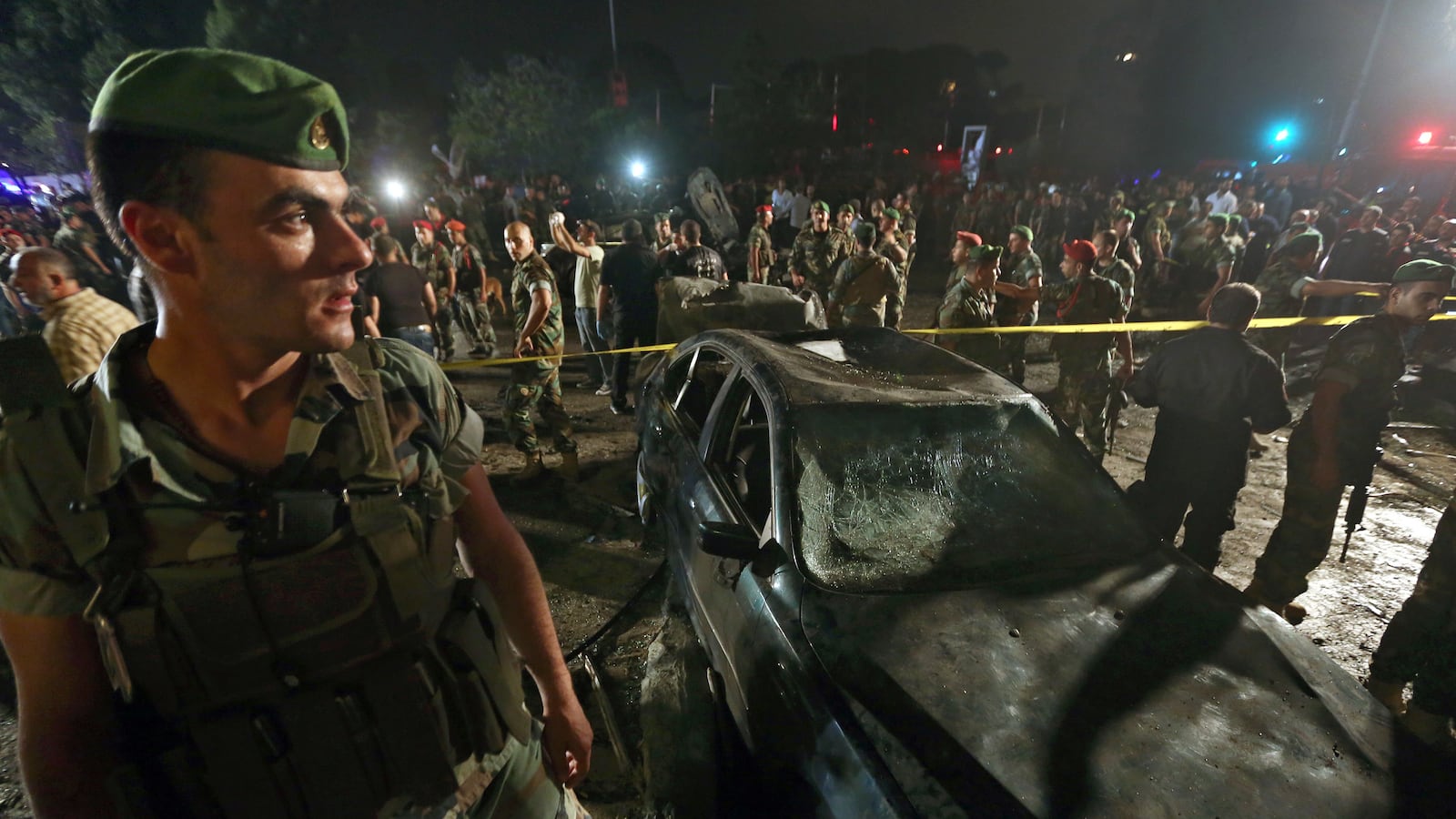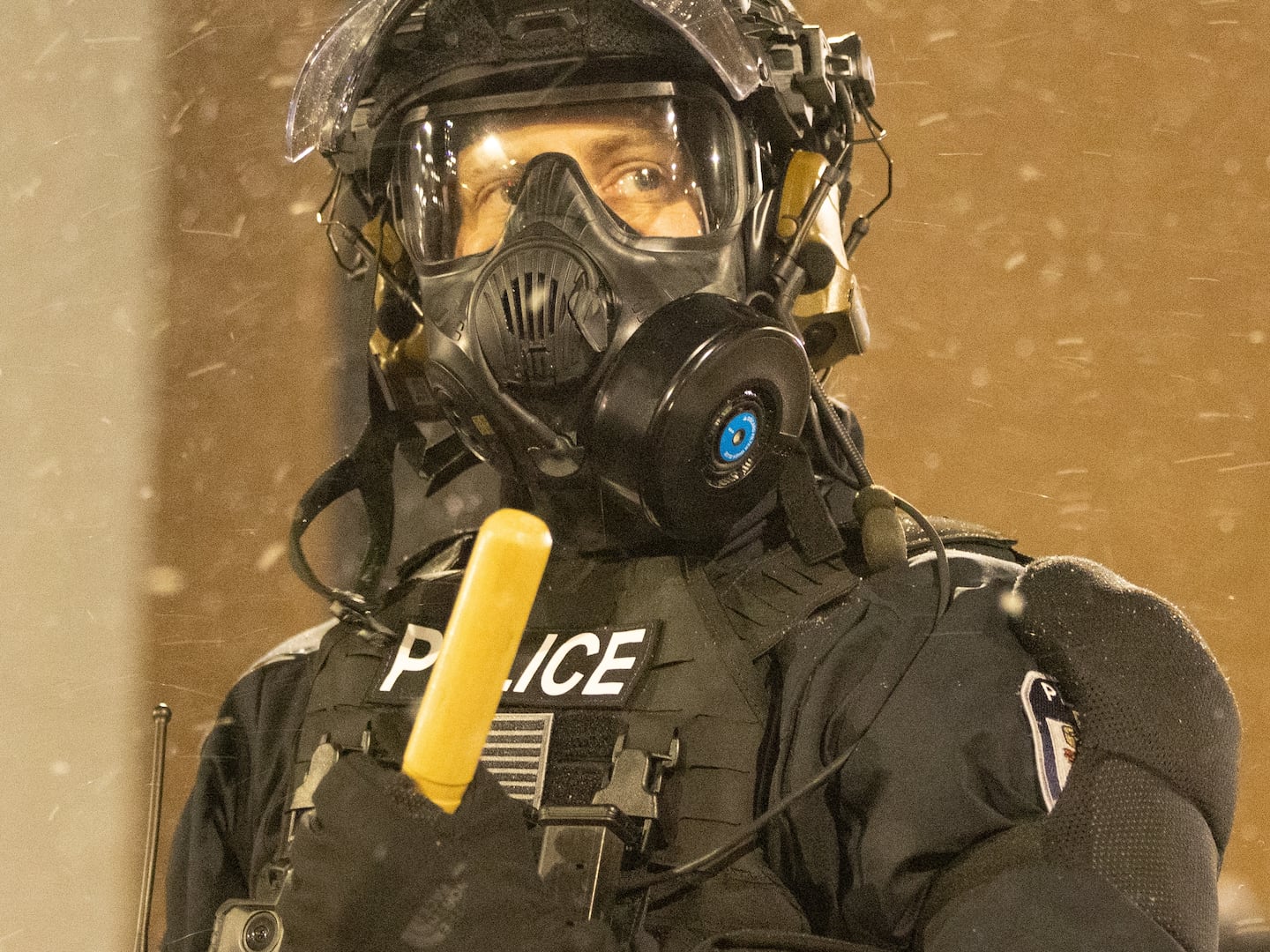BEIRUT, Lebanon — Irish bombers used to have a grim mantra they would throw in the face of British authorities when one of their attacks didn’t go according to plan. “You have to be lucky all the time; we only have to be lucky once.” At the weekend the jihadist planners of a weekend bombing in Lebanon may have been muttering darkly to themselves something similar as they seek to open up fully a third front in their war in the Levant.
Lebanon escaped a big hit on Sunday night because a suicide bomber had a mechanical problem with his car and instead of arriving at his intended target in the Shia-dominated southern suburbs triggered his device prematurely near a Lebanese army checkpoint at one of the area’s main entrances. A Lebanese soldier was killed and more than 20 civilians were injured. Most of them were at café watching World Cup soccer when the explosion erupted.
It could have been much worse. Lebanese security forces say the bomber’s target was a bigger one right in the heart of the southern suburbs, the Beirut homeland of Hezbollah, the militant Lebanese Shia movement.
The signs are that in the coming weeks al Qaeda offshoot the Islamic State of Iraq and al-Sham (ISIS) will be following through in Lebanon in a bid to sow not only more mayhem and confusion in the Levant but in an effort to put pressure on the Lebanese militant Shia movement Hezbollah to start withdrawing some forces from neighboring Syria, where they have been a key factor in helping President Bashar al-Assad turn the tide of battle against rebels seeking to oust him.
“Spillover” is the description most reporters use for the episodic violence in Lebanon – from cross-border rocket jousting between Hezbollah and Syrian rebels to more than a dozen car bombings that have rocked Lebanon in the past two years. But the three countries are not separate saucepans – they are one boiling cauldron.
ISIS began as a group in Mosul in Iraq within al Qaeda in Mesopotamia only to regroup along the Syria-Iraq border into a bigger organization with more grandiose ambitions that stretch all the way to Lebanon. And the jihadists are turning the heat up not only in Iraq, where they are leading a Sunni insurgency that has taken a huge swath of territory in the north and west of the country, but in Lebanon, too.
The ISIS insurgency in Iraq is already affecting the war in Syria—and may start reshaping the more clandestine struggle in Lebanon.
Iraqi Shia militiamen who were in Syria assisting Bashar Assad’s forces mostly in the Damascus suburbs reportedly are returning home to try to battle the Sunni advance against the Shia-dominated government of Prime Minister Nouri al-Maliki. One fighter told AP: “We took part in the fighting in Syria. But now the priority is Iraq.”
The Shia militiamen’s exodus from the fight in Syria – some estimates put their number as high as 30,000 – will leave a gap in the Assad war machine. Firas Abi Ali, an analyst with the risk assessment consultancy IHS, says Hezbollah will likely fill the gap left by Shia militiamen returning to Iraq. But he believes the withdrawal won’t be accomplished quickly, since ISIS controls the land routes, and the departure as it unfolds probably will “reduce the ability of the Syrian government to mount new offensives and place it on the strategic defensive.”
So, for ISIS and Sunni militants there is now every reason to increase the pressure in Lebanon on Iran-backed Hezbollah. And the signs are that they are.
A bombing spate in Lebanon last year started to tail off in the winter. Lebanese security officials put that down to their increased vigilance and better policing. But it may have had more to do with the strategic priorities of ISIS and the official al Qaeda affiliate Jabhat al-Nusra as well as a successful offensive by Hezbollah and Syrian government forces in the mountainous Al-Qalamoun—a rugged region that runs from the rural outskirts of the Syrian capital to the Lebanese border.
Hezbollah officials and Lebanese security sources say the cars in some of the bomb attacks were rigged with explosives in the Al-Qalamoun town of Yabrud and driven into Lebanon through the Lebanese border town of Arsal. That route was interdicted with the retaking of Yabrud by the Syrian army this winter – to the relief of Hezbollah, which was suffering acute political embarrassment as a result of a string of suicide blasts in its own backyard of Beirut’s southern suburbs.
ISIS, Jabhat al-Nusra and the Abdullah Azzam Brigades claimed responsibility for the bombings.
But now there is an uptick in jihadist activity and the Lebanese are alarmed. The speaker of the country’s dysfunctional parliament, Nabih Berri, sees a connection with the Iraq crisis. “The security situation is dangerous in light of what is happening in Iraq,” he said Tuesday.
The weekend explosion – the suicide bomber stopped in the middle of the street, prompting the suspicion of Lebanese soldiers who questioned him – was a near miss as far Lebanese security chiefs are concerned. The car’s malfunction spared Beirut “a real disaster,” according to a statement issued by Lebanon’s General Security agency.
Last Friday, Lebanon witnessed another suicide bombing -- at a police checkpoint on the Beirut-Damascus highway. A policeman was killed and 33 people wounded. The target appears to have been the head of General Security, Maj. Gen. Abbas Ibrahim. A convoy he was traveling in was a couple of hundred meters from the explosion.
Lebanese security agencies have been quick to try to nip what could well be a new bombing spate in the bud. Last week, they raided hotels in Beirut’s Hamra, a predominantly student and artistic district also favored by tourists, and arrested 17 people, releasing all but three later. A Frenchman who was detained told his interrogators he had been recruited by ISIS. And Wednesday, Lebanese authorities arrested in the northern city of Tripoli six members of what they termed a “criminal cell,” including a university professor and two students.
But as fast as the authorities work to avoid becoming a third front, long-suffering Lebanon ultimately is too small, too close to the action, and too friable to hold out for long.






